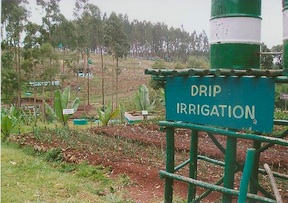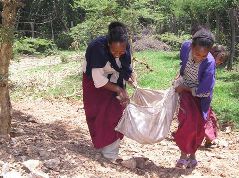Eco-Twinning
 |
 |
 |
Eco-twinning, as part of the UN-ARC Seven Year Plan, will encourage practical action on climate change, linking communities that are experiencing its problems directly.
|
Many people in the West wonder what they can do to support people and communications already directly affected by climate change. What can they do to practically help those paying the price for green house gas emissions that have mostly been carried out by industrialised countries?
One answer, as part of ARC's 7 year plan project is eco-twinning, linking faith groups - initially churches - and faith schools in the global north with those in the global south that are experiencing the detrimental effects of climate change first hand.
Eco-twinning offers an opportunity for those in the developed world not only to understand the impacts of climate change on the lives of other communities - but also to do something to help. It is more than just carbon offsetting. Rather than making a one-off, token gesture as so much carbon offsetting has already proven to be, it is about allowing understanding, relationships and practical actions to develop over the long term. It is a very practical and viable next step for church communities to take on the journey of reacting responsibly to climate change, once they have changed their light bulbs, insulated their roof spaces, assessed car-pooling and moved to Fair Trade. This idea was endorsed at the recent AACC climate change conference of church leaders.
Leaders representing National Christian Councils and Churches from the Fellowship of Christian Councils and Churches of Southern Africa and the Fellowship of Christian Councils and Churches in the Great Lakes and the Horn of Africa, recommended eco-twinning as one way churches and faith based organisations could stand in solidarity with those experiencing climate change. Link here to read the AACC Leaders' Statement on Climate Change and Water Consultation.
Where does the idea of eco-twinning come from?
The germ for this idea came in 2007, after the All Africa Conference of Churches in Nairobi, Kenya published the results of research they had undertaken among four national church councils and 71 churches in mostly sub-Saharan Africa. The research - commissioned by the Alliance of Religions and Conservation (ARC) - revealed that the majority of churches in Africa were already aware of the importance of ecologically sustainable development and also that the level of awareness had steadily increased during the last few years. One of the reasons for this was probably because climate change was already having substantial impact on many local communities in sub-Saharan Africa - including changes in rainfall patterns, water flow land degradation, alteration of crop cycles and other environmental imbalances.
While many African Churches were already involved in promoting the conservation of the natural environment, the majority of people surveyed said that if they were to expand their environmental outreach they needed more training, finance, and perhaps most critically they needed the confidence that they were not facing these issues alone. ARC then had the idea of putting communities already affected by climate change in partnership with those who have yet to experience its effects, in the hope that everyone - and the earth - will benefit.
 |
 |
 |
Girls construct a bio-gas digester at Sebata Nunnery school, Ethiopia. This project is funded by ARC and is an example for eco-twinning. |
How does it work?
A church in the global north is matched with a project proposed and managed by a church in Africa. It is important that the projects are proposals from the grassroots and so reflect what Christians affected by climate change perceive as their needs. It does not just mean richer parishes in the north paying for eco-projects in the south. Web-based communication links could be set in place, building ongoing relationships. Additionally, church schools in both places would be encouraged to tailor their environmental lessons around what they learn from each other’s communities and their environmental concerns and passions. The projects would be run and managed through the local church. The two churches twinned would directly manage the funding relationship and the development of the twinning. Conservation International has expressed interest in providing technical expertise and assistance particularly for US-based eco-twin arrangements, either through its field offices or its vast network of conservation partners.
This could also work with schools, and the BBC has a new and useful site for linking schools, internationally, on subjects connected with the environment. While not being specifically linked to faith schools, it is anticipated that many faith schools around the world will participate. Link here for details of the BBC's World Class site, which not only links schools but also publishes a monthly email newsletter which highlights the latest developments in international school linking. World Class encourages children and schools to broadcast their stories on air and on online with the BBC.
How are projects proposed?
The initial projects will come from those suggested by the All Africa Conference of Churches in 2007. Or, if a church group or diocese already has a twinning relationship with a church or diocese in the global south, eco-twinning can be added relatively easily as another dimension to that existing relationship. This idea can be expanded to include eco-twinning a town or city (with all its faith groups) with a larger eco or climate change project in the global south, building on existing twinning arrangements.
The Pilot Projects
The AACC has compiled a short list of practical potential pilot projects, including:
* An afforestation project in The Congo, which would be conducted through the Salvation Army;
* Restoration and conservation of degraded lands in Ghana, which would be conducted through the Evangelical Presbyterian Church;
* Conservation programmes in the Kilimanjaro region of Tanzania through Tanzania’s Evangelical Lutheran Church;
* Eco-training through theological institutes and parish visits by the Anglican Church of Kenya;
* An organic farming and alternative conservation programme run by Ethiopia’s monasteries;
* A South African project to make coffins out of timber from invasive trees and distribute them to poor families.
What Happens Next?
Once a project is finished, both parties will discuss how to proceed, including whether the project could be replicated within the same community and whether it could be expanded or replicated elsewhere in the country. It is hoped that the relationship between the twinned churches will last for longer than the project itself, and that this will be just the beginning of a long-term friendship and discussion on how to work together to help the global natural environment. We hope other faiths and their diasporas will create something similar.
How can we develop our own eco-twinning?
ARC will not be running these projects, but in the beginning we will act as advisors while the churches take the idea and run with it. If your faith community already has a twinning arrangement, then setting up eco-twinning could be as easy as talking with your partners, discussing how the degradation of the natural environment is affecting your communities and what, with your shared energies and knowledge, you can start to do about it together. We always like to hear about partnerships as they happen - so please keep us informed.
“We live within the covenant God makes with all living things, and we are in relationship with them...
We must listen to the people who fish the sea, harvest the forest, till the soil, and mine the earth, as well as to those who advance the conservation, protection, and preservation of the environment...”
(excerpt taken from an Evangelical Lutheran Statement on the Environment)
Links
Link here for more details of the UN/ARC 7 Year Environmental Programme.
Link here to download the latest guidelines document to the full Seven Year Plan (Note this is a file of 2MB).
Link here to download the eco-twinning leaflet. (1,895 KB)
And link here for details of ARC's eco-coffins project in South Africa.
And here for details of the BBC's World Class site. BBC World Class encouarages linkage between schools globally through themed events in which twinned schools can participate. It publishes a monthly email newsletter which highlights the latest developments in international school linking. World Class also encourages children and schools to broadcast their stories on air and on online with the BBC.
Background
Climate change is affecting all countries but the least developed countries and other vulnerable developing countries are being hit earliest and hardest.
Sub-Saharan Africa is already experiencing the effects of climate change. For communities that depend on rain-fed subsistence farming and livestock keeping, tackling climate change and protecting the environment is already a matter of life and death. Sub-Saharan Africa is slowly getting starved of water. In Northern Kenya, for example, the last decade has seen a four- fold increase in droughts, leaving 80 percent of the population dependant on food aid.
Speaking on climate change in Nairobi, Kenya to a gathering of Eastern and Southern African Church leaders in June 2008, the President of the All Africa Conference of Churches, which represents more than 120 million Christians, the Rt Rev Dr Nyansako-Ni Nku, warned, “An estimated 20 million people, many of them in sub-Saharan Africa, have already been displaced by problems linked to a damaged environment, ranging from eroded farmland to polluted water supplies, hence the new phenomenon of environmental refugees in the Continent. A United Nations think-tank has predicted as many as 50 million environmental refugees, most of whom would be from Africa, could be driven from their homes by 2010 through increased desertification, drought, flooding, storms and rising sea levels associated with global warming.”
Link here for the keynote address by the AACC President.
|

